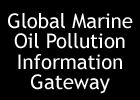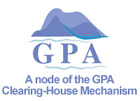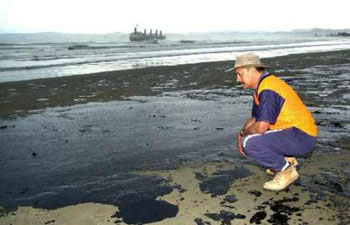|
International
actors and agreements in the region
 The Great Barrier Reef (Australia) has been designated
as a Particularly Sensitive Sea
Area in accordance with IMO
resolution A.927(22). When approved as a PSSA, specific
measures can be used to control the maritime activities
in that area, such as routeing measures, strict application
of MARPOL discharge and equipment requirements for ships,
such as oil tankers; and installation of Vessel Traffic
Services (VTS). The Great Barrier Reef PSSA, between
the Quensland coastline and nearest land, defined as
a line drawn between co-ordinates on the outer edge
of the reef. Oil tankers are prohibited from discharging
within 50 nautical miles of the outer edge of the Reef
and up to 200 nm from the Quensland coast.
The Great Barrier Reef (Australia) has been designated
as a Particularly Sensitive Sea
Area in accordance with IMO
resolution A.927(22). When approved as a PSSA, specific
measures can be used to control the maritime activities
in that area, such as routeing measures, strict application
of MARPOL discharge and equipment requirements for ships,
such as oil tankers; and installation of Vessel Traffic
Services (VTS). The Great Barrier Reef PSSA, between
the Quensland coastline and nearest land, defined as
a line drawn between co-ordinates on the outer edge
of the reef. Oil tankers are prohibited from discharging
within 50 nautical miles of the outer edge of the Reef
and up to 200 nm from the Quensland coast.
 See
Global action and Global
actors.
See
Global action and Global
actors.
 UNEP
Regional Seas Programme. ••>
UNEP
Regional Seas Programme. ••>
 UNEP Global programme of action for the protection of
the marine environment from land-based activities (UNEP
GPA). ••>
UNEP Global programme of action for the protection of
the marine environment from land-based activities (UNEP
GPA). ••>
UNEP
Regional Office for Asia and the Pacific (ROAP). ••>
 UNEP Regional Resource Centre for Asia and Pacific (RRC.AP).
••>
UNEP Regional Resource Centre for Asia and Pacific (RRC.AP).
••>
 UN Economic and Social Commission for Asia and the Pacific
(ESCAP). ••>
UN Economic and Social Commission for Asia and the Pacific
(ESCAP). ••>
 Small
Island Developing States Network (SIDSnet). ••>
Small
Island Developing States Network (SIDSnet). ••>
Regional
conventions, agreements, action plans and actors
 Convention for the Protection of Natural Resources and
Environment of the South Pacific Region (Nouméa
Convention/SPREP Convention) • South Pacific Regional
Environment Programme (SPREP). ••>
Convention for the Protection of Natural Resources and
Environment of the South Pacific Region (Nouméa
Convention/SPREP Convention) • South Pacific Regional
Environment Programme (SPREP). ••>
 Convention
on Conservation of Nature in the South Pacific (Apia
Convention). ••>
Convention
on Conservation of Nature in the South Pacific (Apia
Convention). ••>
 Convention
to Ban the Importation into Forum Island Countries of
Hazardous Wastes and Radioactive Wastes and to Control
the Transboundary Movement and Management of Hazardous
Wastes within the South Pacific (Waigani Convention).
••>
Convention
to Ban the Importation into Forum Island Countries of
Hazardous Wastes and Radioactive Wastes and to Control
the Transboundary Movement and Management of Hazardous
Wastes within the South Pacific (Waigani Convention).
••>
 Action Plan for Managing the Environment of the Pacific
Islands Region 2001-2004 (including Pacifc Ocean Pollution
Prevention Programme). ••>
Action Plan for Managing the Environment of the Pacific
Islands Region 2001-2004 (including Pacifc Ocean Pollution
Prevention Programme). ••>
 Oceania
Regional Response Team
(ORRT), an advisory board to the Federal On Scene Coordinator.
The ORRT provides Federal, State and local governmental
agencies with means to participate in responses to pollution
incidents. See also list
of agencies involved.
Oceania
Regional Response Team
(ORRT), an advisory board to the Federal On Scene Coordinator.
The ORRT provides Federal, State and local governmental
agencies with means to participate in responses to pollution
incidents. See also list
of agencies involved.
 UNDP-GEF-SPREP:
Strategic Action Programme for the International Waters
of the Pacific Small Island Developing States.
••>
UNDP-GEF-SPREP:
Strategic Action Programme for the International Waters
of the Pacific Small Island Developing States.
••>
|
 |
Regional
reports on the state of the marine and coastal environment
 SPREP: Pollution
in the Pacfic. See also the report "Improving
Ships' Waste Management in Pacific Islands Ports".
SPREP: Pollution
in the Pacfic. See also the report "Improving
Ships' Waste Management in Pacific Islands Ports".
 UNEP: Asia
Pacific Environment Outlook 2. Published periodically
to present the state of environment and its trend in
the region. The report aims to critically review the
existing status of the environment, the driving forces
for changes, and the existing set of policy initiatives
undertaken to confront environmental challenges.
UNEP: Asia
Pacific Environment Outlook 2. Published periodically
to present the state of environment and its trend in
the region. The report aims to critically review the
existing status of the environment, the driving forces
for changes, and the existing set of policy initiatives
undertaken to confront environmental challenges.

 Pacific
Islands Environment Outlook. Part of a UNEP project
to produce state of the environment assessments for
the countries of the Caribbean, Western Indian Ocean
and Pacific Islands. Co-ordinated by SPREP, on behalf
of UNEP and with the financial assistance of the EU.
Pacific
Islands Environment Outlook. Part of a UNEP project
to produce state of the environment assessments for
the countries of the Caribbean, Western Indian Ocean
and Pacific Islands. Co-ordinated by SPREP, on behalf
of UNEP and with the financial assistance of the EU.
 ESCAP: State
of the Environment in Asia and the Pacific 2000.
ESCAP: State
of the Environment in Asia and the Pacific 2000.

 UNEP GPA: Overview
of Land-based pollutant Sources and Activities affecting
the Marine, Coastal and Freshwater Environment in the
Pacific Islands region.
UNEP GPA: Overview
of Land-based pollutant Sources and Activities affecting
the Marine, Coastal and Freshwater Environment in the
Pacific Islands region.
 UNEP GPA: South
Pacific Region (brief description of environmental
state, priority issues, etc.).
UNEP GPA: South
Pacific Region (brief description of environmental
state, priority issues, etc.).
 UNEP:
Global
Environment Outlook 3 (GEO3). Coastal and marine
areas.
UNEP:
Global
Environment Outlook 3 (GEO3). Coastal and marine
areas.
 University
of Rhode Island: Large Marine Ecosystems (LME):The Region
is made up of the following LMEs:
Northeast
Australian Shelf and Great Barrier Reef • East-Central
Australian Shelf • Southeast
Australian Shelf • Southwest
Australian Shelf • New
Zeeland Shelf.
University
of Rhode Island: Large Marine Ecosystems (LME):The Region
is made up of the following LMEs:
Northeast
Australian Shelf and Great Barrier Reef • East-Central
Australian Shelf • Southeast
Australian Shelf • Southwest
Australian Shelf • New
Zeeland Shelf.
National
action
 Australian
Maritime Safety Authority (AMSA). ••>
Australian
Maritime Safety Authority (AMSA). ••>
 Great Barrier Reef Marine Park Authority. ••>
Great Barrier Reef Marine Park Authority. ••>
 Australian Marine Oil Spill Centre (AMOSC). ••>
Australian Marine Oil Spill Centre (AMOSC). ••>
 Australian Coastal Atlas. ••>
Australian Coastal Atlas. ••>
 Maritime Safety Authority of New Zealand. ••>
Maritime Safety Authority of New Zealand. ••>
 New Zealand Petroleum. ••>
New Zealand Petroleum. ••>
Private
sector and NGOs actors and initiatives
Australian
Petroleum Production Exploration Association (APPEA).
••>
 Australian Institute of Petroleum (AIP). ••>
Australian Institute of Petroleum (AIP). ••>
 Oilwatch. ••>
Oilwatch. ••>
 International Tanker Owners Pollution Federation (ITOPF).
••>
International Tanker Owners Pollution Federation (ITOPF).
••>
 International Directory of Oil Spill Cleanup Contractors
and Response Organisations. ••>
International Directory of Oil Spill Cleanup Contractors
and Response Organisations. ••>
 International Petroleum Industry Environmental Conservation
Association (IPIECA). ••>
International Petroleum Industry Environmental Conservation
Association (IPIECA). ••>
|



